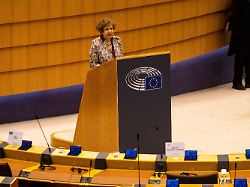Working for the Russian FSB?
Latvian security police interrogate MEPs
February 12, 2024, 1:05 p.m
Listen to article
This audio version was artificially generated. More info | Send feedback
The Latvian MEP Tatjana Zdanoka is accused of working for the Russian secret service for years. Latvia’s security police are now questioning them. However, the authorities’ hands are partly tied in the investigation against Zdanoka.
Latvia’s security authorities have opened an investigation against MEP Tatjana Zdanoka. According to a report on Latvian television last week, the security police summoned the 73-year-old because of possible contacts with the Russian secret service FSB. Zdanoka confirmed a corresponding conversation, the content of which she had undertaken to keep confidential, she said, according to the program published on Sunday evening.
Zdanoka, who has been a member of the European Parliament since 2004 and is currently not a member of any political group, also rejected the allegations. According to his own statements, another leading member of Zdanoka’s party, the Russian Union of Latvia, was also invited to an interview by the authorities. According to the report, Zdanoka is said to have been commissioned by Russian intelligence to promote pro-Kremlin sentiment in the Baltics.
In addition, the politician, who repeatedly openly represented Russian positions, was looked after by two different agents from at least 2004 to 2017, it was said in leaked emails, citing relevant correspondence. The security authorities’ hands are sometimes tied during the investigation, as the published correspondence mostly dates from the years before 2016.
At that time, supporting a foreign state could not be punished under criminal law in Latvia. A corresponding change in the law only came into force in 2016. The European Parliament has opened an investigation into the MEP. In a resolution adopted on Thursday, European representatives said they were “completely outraged and deeply concerned by Russia’s ongoing efforts to undermine democracy in the EU.”
